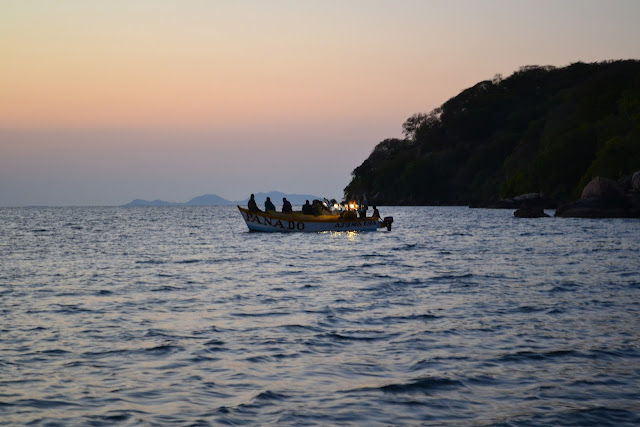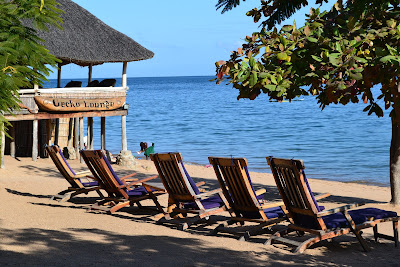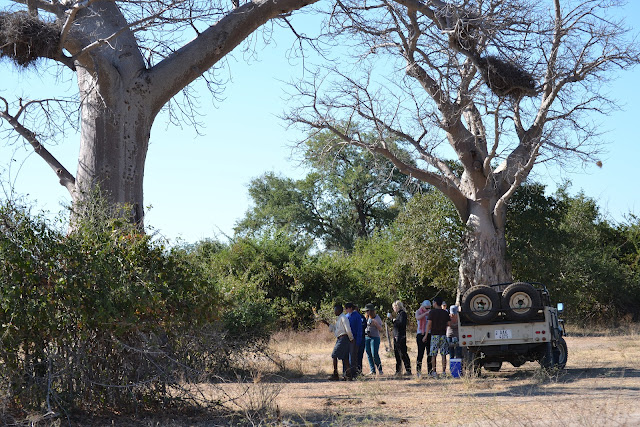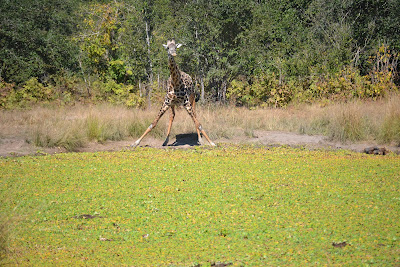We arrived back in Lilongwe on Thursday evening from South Luangwa. We decided to leave for Blantyre on Friday, late morning/early afternoon. We were up early and went off for a short cycle at 6h00. It was beautiful to watch the sun rise over the hills, with the mist still hanging over the valleys.
After breakfast we decided to make a quick stop at the Lilongwe market, in Old Town. Pictured above is the entrance to the market, it is a huge area enclosed by walls. You can see just part of the wall in the picture. Unfortunately I couldn't take pictures inside the market, because the people at the stalls expected me to pay them to take pictures of their stalls. I don't really like that idea.
The market was like nothing I've seen before. There are lanes and alleys filled with all sorts of wares, arranged in areas keeping the same type of goods in the same lane or lanes. The butchery and fresh fish lanes didn't smell too good and I tried not to breath through my nose for fear of vomiting. The dried fish area was much better, except for all the flies buzzing around. There was a lane of tailors all sitting with their old black
Singer sewing machines. There were stalls with dried goods like rice, sugar and maize; stalls with spices; stalls with legumes and herbs of all shapes and colours; book stalls.
But the lane that was the most amusing to me was the "spare car parts" lane. You could literally build a car from scratch with the goods in that area. There were piles of every imaginable car part and of course macho men carrying heavy car parts between stalls, or just hanging around. Seeing two foreign looking girls walking through, they became a bit more macho and called out to us as we walked by. None of it was aggressive, mostly good natured greetings or an offer for us to see what they were selling. Some guys were sitting and playing a game of Malawian Bawo and one shouted out that he could teach us how to play. Maybe if I'd had time, I would've taken him up on the offer.
 |
The Old Town mosque, on the other side of the market
|
We ended up leaving for Blantyre later than planned. Being about a journey of less than 300km, perhaps we were a bit naive about the length of time it would take us to complete the journey.
Trying to get out of Lilongwe on a Friday afternoon can be challenging. With Iain's advice we managed to avoid having to drive through Old Town again, where traffic would be thick and slow. As we got onto the M1, (Malawi's main road connecting Lilongwe and Blantyre) we mistakenly thought we could make up for lost time, but had barely gotten out of Lilongwe when we were stopped by a traffic cop.
She was a tall lady dressed in a brown uniform with white gloves and she coolly walked up to Anna's window and ignored Anna's polite: Mwazwera bwanji?
She said: Do you know what speed you were traveling at? You were cruising along at 78km/h. This is a 60 zone. You must pay a fine of 5000 kwacha.
Anna said: Yes, sorry! I don't have 5000 kwacha. What can I do?
(We really didn't have cash on us, and had just been discussing the fact that speeding fines are paid immediately at the side of the road in Malawi, and that we didn't have 5000 kwacha on us, when we saw the cop's white gloved hand waving us down!!)
She said: No! You do have the money, you have it. Go over there and pay.
We managed to scrape together 2700 kwacha, including a few notes I'd noticed in the cubby the day before and Anna went over to where she had to pay the fine. She managed to get away with only paying K2000, but made sure it wasn't a bribe by asking for a receipt. When she was walking away she mentioned that she worked as a doctor at Kamuzu Central, and it seemed that if she had said that earlier she may have gotten away without paying any fine at all!
Driving out of Lilongwe, the landscape became very scenic, and when we weren't worried about the people riding bicycles along the side of the road (or people walking along the side of the road, or goats in the road, or getting stuck behind big trucks) it was an enjoyable drive.
When it got dark it was a little less pleasant. The main highway in Malawi has only two lanes: one in each direction. This makes overtaking a challenge, and driving becomes less than pleasant at night, when you constantly have oncoming headlights shining in your eyes.
The drive to Blantyre took us about 5 hours in the end. Besides all the other challenges of driving in Malawi, the main highway passes through many villages where the speed limit is 50km/h and there are also many random road blocks along the way.
We were also somewhat delayed by the challenge of finding an ATM along the road. We stopped in Dedza where there were a few ATMs, but even then it took some time finding an ATM with money in it which would accept Visa cards.
We arrived in Blantyre after 20h00, and having come from Lilongwe, we were a bit doubtful about finding somewhere for dinner at that hour. To our pleasant surprise, the lady at the
Kabula Lodge where we stayed, (Alice) assured us that it would be no problem at all finding dinner.
(We had been out for dinner in Lilongwe the Friday before. There were two other tables occupied in the restaurant besides ours, and it was empty before 21h00.)
We arrived at Bombay Palace around 21h00 and were very happy to find the place full and lively. Across the road from Bombay Palace, stood a Protea Hotel with a restaurant and bar next door called 21 Grill. It looked a bit fancy, which was why we didn't eaten dinner there, not being dressed for the occasion. After dinner at Bombay Palace, we decided they couldn't stop us from looking in at 21Grill. So off we went to look.
We walked into 21 Grill after 22h00 and it was warm and buzzing, with live music playing. It was like we had arrived in New York after having been in Namibia!
When we left, after 23h00, there were still people eating at the restaurant, and the bar was still quite busy.

On Saturday morning we woke to find that Blantyre was very green. We spent the day living the 'city' life. First stop was
Central Africana Bookshop, then on to Chichiri mall where there was even a cinema. (Lilongwe has no cinema.) We found out that they only have two theatres, with twice daily screenings during the week (17h30 and 20h30) and an extra 14h30 screening on Saturdays. Since we had dinner plans, we decided to see a 14h30 show. Our choices were: Dr Seuss'
The Lorax and
American Pie The Reunion. If we really wanted to come back at 17h30, Bollywood's
Don't Angry Me would replace
The Lorax.
We decided on Dr Seuss, even though I had already seen it a while back, since Anna hadn't been to see a movie in quite a while. It was entertaining and a nice reminder that:
Unless someone like you cares a whole awful lot, nothing is going to change. It's not. And I suppose that's not a bad principle to apply to life.
On the whole, Chichiri mall was really rather disappointing. Besides the range of ATMs, the Shoprite and Game, and the petrol station with fuel and without queues, there really wasn't much else. We did stop at Central Bookshop in the mall. It's small, but it did have a few books by Malawian authors. Also, they were the only bookshop in Malawi which Anna has come across thus far, who even claimed to stock the well known Malawian book
The Boy Who Harnessed the Wind. But they were out of stock when we visited.
For dinner we met another very interesting man in the field of obstetrics, Dr Francis Kamwendo, and his wife.
Francis works at the Queen Elizabeth Hospital in Blantyre at present, and lectures at the medical school.
He was born and raised in Malawi. But in 1963, just before independence came to Malawi, he left to further his studies at the university in Lesotho. Traveling via apartheid South Africa at that time, was challenging for him as a black man. He was met at the airport by the Malawian ambassador and taken to his house and then put on a train from Johannesburg to Lesotho.
At the university in Lesotho he was doing his BSc, with the view of one day studying medicine. He did very well in his studies, and within a short time his Dean called him to say that there was an opportunity for four students from the university to go and study in Sweden, at the University of Uppsala. The Dean felt that Francis should be one of those four students.
Since Francis was on a bursary from the Malawian government, he had to consult with them first. Once they agreed, he told the Dean that he accepted the offer. Within a short time his bags were packed and he was on his way to Uppsala. He didn't have time to speak with his family about the matter, and simply sent them a telegram saying:
Going to Sweden. More to follow.
He arrived in Johannesburg and once again, it was a challenge for him to transit apartheid South Africa. The head of the Scandinavian Air Services in South Africa at the time, had to make arrangements for him to be allowed to stay overnight in Jo'burg airport hotel. They found a room for him which was away from everyone else, it happened to be a big room. He wasn't allowed to leave the room. A Malawian was found, to serve him meals in the room. The fellow Malawian obviously thought Francis was very lucky to be in a big hotel room, but Francis said he just felt like a prisoner.
The next day he was on the flight to Stockholm, which stopped over in Nairobi, where he had been told to contact the Swedish embassy to obtain a Swedish visa. It was after hours, but he managed to get hold of the high commissioner somehow. Unfortunately, the high commissioner was not impressed at being disturbed after hours and brusquely told Francis to continue on to Stockholm, the visa would be sorted out when he landed.
When he landed at Arlanda International in Stockholm, he was detained because he had no visa. On the other side of the border was the representative from Uppsala university, waiting to meet him. In a time devoid of any mobile communication, the representative managed, eventually, to track Francis down and a visa was arranged for him.
Francis continued to do well in his studies at Uppsala, and in 1967 permission was granted and he was the first black man admitted to Uppsala university's medical school, on condition that he would go back to work as a doctor in Malawi.
After completing his medical degree, Francis went back to Malawi, where he worked as a general practitioner for 5 years. By that time he was married to a Swedish physiotherapist, who went to Malawi with him. After working in Malawi, he decided that he wanted to specialize in Obstetrics & Gynaecology, and after exploring many options, he eventually landed up specializing back in Sweden.
After retiring from work in Sweden in 2003, Francis moved back to Malawi. His wife joined him a little later and also lectures at the medical school, but doesn't do any clinical work.
We had thought we would have an early night on Saturday, seeing as we were planning on climbing
Mount Mulanje on Sunday. We set the dinner time for 18h30, but we were the second last table to leave the restaurant that evening.
We drove back to Kabula Lodge, laughing about how Saturday evening dinners in Malawi were for meeting interesting people. Already an eventful weekend, and it wasn't even over yet!
























































